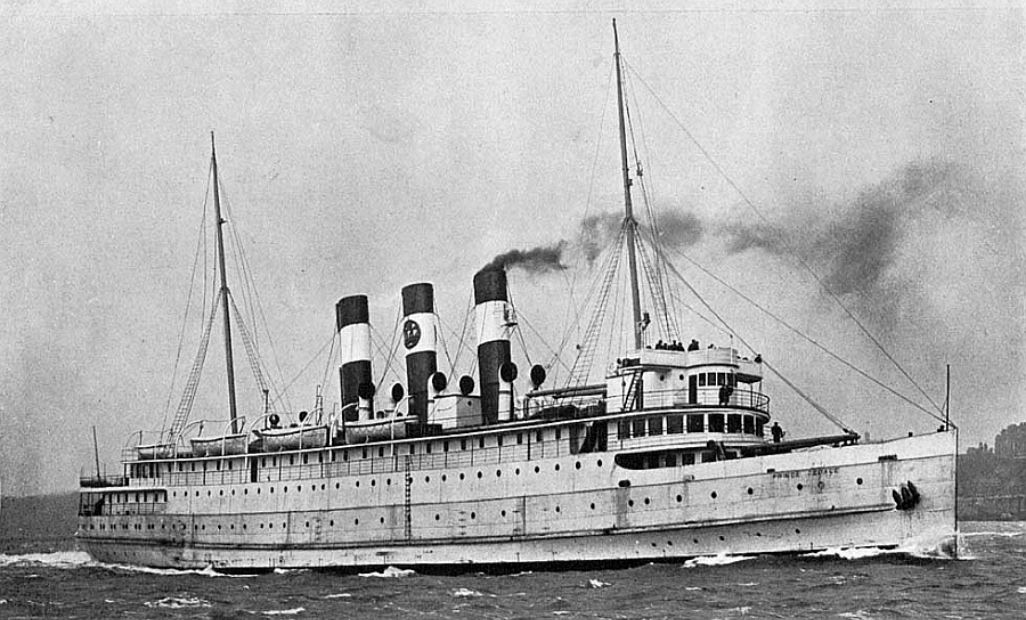Difference between revisions of "HMT Prince George"
From Our Contribution
| (2 intermediate revisions by the same user not shown) | |||
| Line 1: | Line 1: | ||
| − | {{Infobox | + | {{Infobox ship |
| − | | | + | | image = [[File:HMT_Prince_George.jpg]] |
| − | |||
| − | |||
| − | |||
| − | |||
| − | |||
| − | |||
| caption = | | caption = | ||
| − | | | + | | image2 = [[File:HMT_Prince_George_1.jpg]] |
| caption2 = | | caption2 = | ||
| − | + | | shipname = HMT Prince George | |
| − | + | | shipowner = Grand Trunk Pacific Development Co Ltd, Newcastle | |
| − | + | | shipbuilder = Swan Hunter and Wigham Richardson Ltd, Wallsend-on-Tyne | |
| − | + | | shipyardnumber = 859 | |
| − | + | | shiplaunched = 10 Mar 1910 | |
| − | | | + | | shipcompleted = May 1910 |
| − | + | | shipinservice = 1910 | |
| − | | | + | | shipoutofservice = 22 Sep 1945 |
| − | | | + | | shipinservice2 = |
| − | + | | shipoutofservice2 = | |
| − | | | + | | shipreclassified = |
| − | | | + | | shipID = |
| − | + | | shipfate = broken up in Seattle | |
| − | | | + | | shiptype = Passenger Refrigerated Cargo |
| − | | | + | | shiptonnage = 3,320 tons |
| − | + | | shiplength = 306ft 7in (93.44m) | |
| − | | | + | | shipbeam = 42ft 2in (12.85m) |
| − | | | + | | shipdepth = 24ft (7.32m) |
| − | + | | shippropulsion = twin screw | |
| − | | | + | | shipspeed = 18 knots (33.34 km/h) |
| − | | | + | | shipcapacity = 200 x 1st & 36 x 2nd Class passengers - For excursions, up to 1,500 x passengers could be carried |
| − | |||
| − | | | ||
| − | | | ||
}} | }} | ||
| Line 40: | Line 31: | ||
Capable of carrying 1,500 for an excursion, or 200 first class and 36 second class passengers. Operated as a Hospital Ship for the Royal Canadian Navy during World War 1. Operated by the Grand Trunk Railroad system for the time it was not used by the Canadian Navy. | Capable of carrying 1,500 for an excursion, or 200 first class and 36 second class passengers. Operated as a Hospital Ship for the Royal Canadian Navy during World War 1. Operated by the Grand Trunk Railroad system for the time it was not used by the Canadian Navy. | ||
| − | In 1945 she caught fire in harbour at Ketchikan, Alaska and the burned hulk was beached on | + | |
| + | |||
| + | After the war she Provided passenger service along the coasts of British Columbia & Alaska. In 1945 she caught fire in harbour at Ketchikan, Alaska and the burned hulk was beached on Gravina island until 1949 when it was refloated and towed to Seattle where it was broken up. | ||
==Soldiers carried== | ==Soldiers carried== | ||
Latest revision as of 02:27, 4 November 2021
Remarks
Capable of carrying 1,500 for an excursion, or 200 first class and 36 second class passengers. Operated as a Hospital Ship for the Royal Canadian Navy during World War 1. Operated by the Grand Trunk Railroad system for the time it was not used by the Canadian Navy.
After the war she Provided passenger service along the coasts of British Columbia & Alaska. In 1945 she caught fire in harbour at Ketchikan, Alaska and the burned hulk was beached on Gravina island until 1949 when it was refloated and towed to Seattle where it was broken up.

